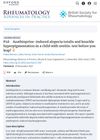TLDR Genetic screening for NUDT15 polymorphisms is crucial for patients taking azathioprine, especially in Asians.
This case report describes a young Chinese female with systemic lupus erythematosus who suffered severe azathioprine-induced myelosuppression and alopecia due to the NUDT15 c.415C>T homozygous variant. The patient experienced a significant drop in white blood cell count and required intensive care. The report emphasizes the necessity of genotyping for NUDT15 and TPMT variants before starting azathioprine therapy to avoid severe adverse reactions. A literature review of 67 articles supports the need for genetic testing and routine blood monitoring to manage azathioprine-induced myelosuppression effectively.
3 citations
,
August 2021 in “Clinical Case Reports” Genetic testing is crucial before giving azathioprine to avoid severe side effects.
 10 citations
,
August 2020 in “Drug metabolism and drug interactions”
10 citations
,
August 2020 in “Drug metabolism and drug interactions” The NUDT15 gene variant causes severe side effects from azathioprine in some Indian patients.
8 citations
,
April 2018 in “Journal of the European Academy of Dermatology and Venereology” Certain genetic variations can make people more likely to experience hair loss and low white blood cell count from azathioprine.
 April 2017 in “Childhood Kidney Diseases”
April 2017 in “Childhood Kidney Diseases” Azathioprine can cause severe blood issues and hair loss, needing careful monitoring and possible discontinuation.
21 citations
,
January 2021 in “Frontiers in Pharmacology” Thiopurines help treat IBD but require genetic testing to avoid side effects.
3 citations
,
August 2021 in “Clinical Case Reports” Genetic testing is crucial before giving azathioprine to avoid severe side effects.
 November 2024 in “Rheumatology Advances in Practice”
November 2024 in “Rheumatology Advances in Practice” Monitor for early signs of azathioprine toxicity and check blood counts regularly.
 January 2024 in “Journal der Deutschen Dermatologischen Gesellschaft”
January 2024 in “Journal der Deutschen Dermatologischen Gesellschaft” Non-biologic immunosuppressive drugs are crucial for treating autoimmune and chronic inflammatory skin diseases.



